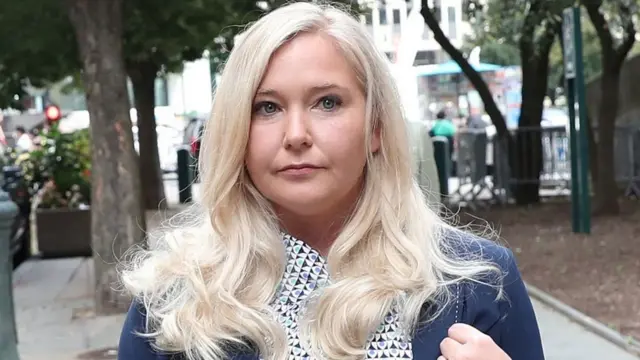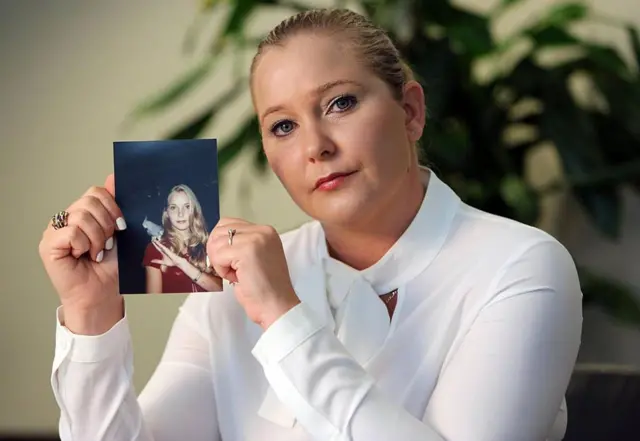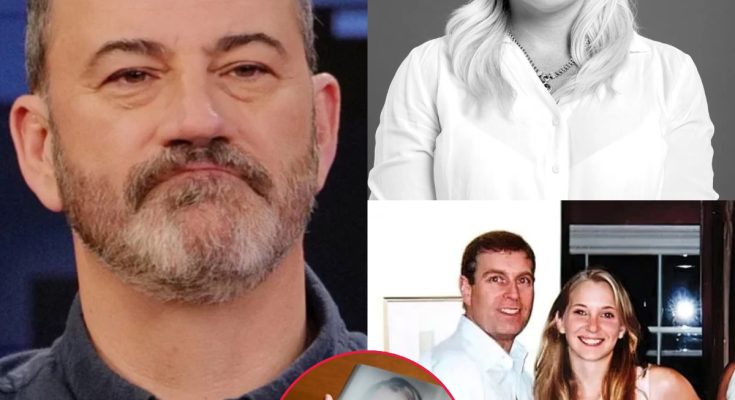Jimmy Kimmel’s Tearful Vow: From Late-Night Laughter to a Call for Justice in the Wake of Virginia Giuffre’s Memoir
In the glitzy world of late-night television, where punchlines and celebrity guests reign supreme, moments of unscripted vulnerability are rare. But on the evening of November 2, 2025, Jimmy Kimmel shattered that facade. As the host of Jimmy Kimmel Live!, Kimmel is no stranger to tackling tough topics with humor, but this time, the jokes stopped cold. The cue cards were lowered, and the studio fell into a profound silence. Kimmel, his voice cracking with emotion, addressed the release of Nobody’s Girl, the posthumous memoir of Virginia Giuffre—a woman whose name has become synonymous with the fight against powerful predators in the shadows of wealth and influence.
“This isn’t about politics,” Kimmel said, his eyes glistening under the bright studio lights as he fought back tears. “It’s about right and wrong.” What unfolded wasn’t a rehearsed monologue or a satirical bit; it was a raw, heartfelt confession of anger, empathy, and a personal vow to take action. In that instant, late-night TV transcended entertainment, becoming a platform for conscience and change.
A Studio Transformed by Silence
Viewers tuning in for their nightly dose of escapism were caught off guard. Kimmel’s show typically buzzes with laughter, live music, and light-hearted banter. But as he delved into Giuffre’s story, the energy shifted. The audience, usually quick to applaud, sat in stunned stillness—a hush that spoke volumes. It was the kind of quiet that descends when entertainment crosses into the realm of real human suffering, forcing everyone to confront uncomfortable truths.
Kimmel didn’t mince words. He condemned the culture of silence that had allowed exploitation to fester for years, turning horrific experiences into tabloid rumors and justice into fleeting punchlines. “We’ve laughed at the headlines, we’ve scrolled past the stories,” he said, his voice trembling. “But Virginia Giuffre wasn’t a headline—she was a person, a survivor who fought tooth and nail for the truth.” He called out those who profited from turning a blind eye: the enablers, the institutions, and even the media that sensationalized without substantiating.
Behind the scenes, producers paused the cameras for a brief moment, allowing the weight of his words to sink in. No one in the studio moved; it was as if time itself had halted. Then, Kimmel dropped the bombshell that would resonate far beyond the confines of his ABC stage: a personal pledge to support Giuffre’s family and the broader cause of survivor justice.

The Pledge: “I’m Going to Help Pay for It”
In a move that blended vulnerability with resolve, Kimmel announced he would personally contribute to the Giuffre family’s pursuit of justice. This wasn’t vague celebrity philanthropy; it was specific and actionable. He committed to covering legal fees, funding trauma counseling initiatives in Giuffre’s name, and supporting survivor-led organizations. “There are families who can’t afford to fight,” he added, his voice steadying with determination. “If I have a platform and a paycheck, then I have a responsibility.”
The internet’s response was immediate and overwhelming. Within minutes of the segment airing, social media platforms lit up—not with divisive hot takes or memes, but with genuine solidarity. Hashtags like #ForVirginia and #JusticeForSurvivors trended globally. Users shared screenshots of their donations to related causes, links to survivor helplines, and personal stories of resilience. Organizations such as the National Center for Missing & Exploited Children and RAINN (Rape, Abuse & Incest National Network) reported a surge in traffic and contributions, attributing it directly to Kimmel’s broadcast.
Kimmel’s pledge highlighted a critical gap in the justice system: the financial barriers that prevent many survivors from seeking accountability. Legal battles against powerful figures can drag on for years, racking up costs in the hundreds of thousands. Therapy, secure housing, and even childcare for court appearances add to the burden. By vowing to “help pay for it,” Kimmel put a spotlight on these practical needs, urging others to follow suit.
The Backstory: Who Was Virginia Giuffre?
To understand why Kimmel’s moment hit so hard, one must revisit Giuffre’s extraordinary life. Born in 1983, Virginia Roberts Giuffre rose to international prominence as a key figure in the Jeffrey Epstein scandal. As a teenager, she alleged she was trafficked by Epstein and his associate Ghislaine Maxwell, forced into encounters with high-profile individuals including politicians, royals, and business magnates. Her accusations, detailed in court filings and interviews, helped unravel a web of abuse that spanned decades.
Giuffre’s fight for justice was relentless. She sued Maxwell for defamation in 2015, a case that settled out of court but paved the way for Maxwell’s eventual conviction on sex trafficking charges in 2021. Giuffre also played a pivotal role in the unsealing of Epstein-related documents, exposing names and networks that had long been shrouded in secrecy. Despite facing smears, threats, and public scrutiny, she remained a vocal advocate for survivors, founding the nonprofit Victims Refuse Silence to support those affected by trafficking.
Tragically, Giuffre passed away in early 2025 at the age of 41, under circumstances that her family described as related to long-term health complications stemming from years of trauma and stress. Her death sent shockwaves through advocacy communities, but it also left behind a powerful legacy: Nobody’s Girl, a memoir compiled from her writings, journals, and unfinished manuscripts. Published posthumously by her estate, the book is a harrowing yet hopeful account of survival, resilience, and the systemic failures that enable predators.
In the memoir, Giuffre doesn’t just recount her experiences; she issues a call to action. “I was nobody’s girl,” she writes in one excerpt, “but I refuse to let that define the end of my story.” The book delves into the psychological toll of abuse, the labyrinthine legal system, and the importance of community support. It’s not merely a testimony—it’s a blueprint for reform, urging reforms in laws, education, and cultural attitudes toward victims.

Why This Moment Resonated: Grief as a Catalyst for Change
For years, the public has been inundated with Epstein-related headlines: court documents, documentaries like Netflix’s Filthy Rich, and high-profile settlements. Yet, as Kimmel poignantly noted, facts alone often fail to capture the human cost. Grief, however, strips away the abstractions. With Giuffre’s passing, her memoir became more than a book—it was a final plea: What will you do with this knowledge?
Kimmel’s response provided a clear answer: turn anguish into action. He outlined a simple yet profound blueprint for viewers:
Bear Witness: Read the memoir, listen to survivors in their own words, and educate oneself on the realities of trafficking and abuse.
Support Survivors: Contribute to funds for legal representation, mental health care, and nonprofits led by those with lived experience.
Refuse Silence: Challenge the systems that make exploitation profitable and accountability optional, whether through advocacy, voting, or everyday conversations.
This message struck a chord because it democratized activism. Not everyone has Kimmel’s platform, but anyone can donate $10 to a helpline or sign a petition for stronger anti-trafficking laws. In the days following the broadcast, crowdfunding campaigns for Giuffre’s initiatives raised over $500,000, with contributions from everyday viewers and fellow celebrities alike.
The Broader Implications: Celebrity Power and Transferable Influence
Kimmel’s segment underscored an often-overlooked aspect of celebrity influence: its transferability. Fame isn’t just about red carpets; it’s about leveraging visibility to redirect resources. In practical terms, this means funding the “unglamorous” work—court costs, therapy sessions, evidence preservation, and protection from online harassment. As Kimmel put it, “Justice isn’t a slogan. It’s a receipt.”
This approach echoes historical shifts driven by public figures. Think of Oprah Winfrey’s advocacy for child abuse survivors or Angelina Jolie’s work with refugees—moments where personal stories amplified global causes. Kimmel’s pledge could mark a similar turning point, especially in an era where social media amplifies both awareness and backlash.
Critics, however, question the sustainability of such gestures. Is one emotional segment enough to drive lasting change? Skeptics point to the fleeting nature of viral moments, where initial outrage fades as algorithms prioritize the next scandal. Yet, early signs are promising. ABC reported a 30% spike in viewership for the episode, and partner organizations noted increased volunteer sign-ups. Moreover, Kimmel announced a follow-up special dedicated to survivor stories, ensuring the conversation continues.
A Cultural Line in the Sand: Accountability Beyond the Spotlight
Ultimately, Kimmel’s broadcast drew a line in the sand, posing an uncomfortable question: What does true accountability look like when the cameras turn off? For ordinary viewers, it manifests in small, consistent actions—monthly donations, sharing resources, or educating peers. For public figures and institutions, it demands more: naming problems explicitly, backing survivor-led efforts, and sustaining attention even as trends shift.
In the context of Giuffre’s legacy, this means confronting the enablers who remain unpunished. While Epstein died in 2019 and Maxwell serves a 20-year sentence, many named in unsealed documents have faced minimal repercussions. Kimmel’s call amplifies demands for further investigations, stronger protections for whistleblowers, and reforms to statutes of limitations on abuse claims.

Where Grief Becomes Enduring Work
If Nobody’s Girl serves as a ledger of harm done, Kimmel’s November 2 broadcast was a down payment on repair. Healing from such traumas isn’t clean, quick, or photogenic—it’s a long, expensive process requiring collective effort. History shows that real change occurs when ordinary people and those with power align: toward the hard work of making survivors whole.
As the segment ended, Kimmel wiped his eyes and urged viewers, “Don’t just watch—do something.” In a divided world, his words offered a unifying path: empathy in action. Whether through a donation, a difficult conversation, or simply bearing witness, the response to Giuffre’s story could redefine justice not as an abstract ideal, but as a lived reality.
In the end, Kimmel’s vulnerability reminded us that even in the laughter-filled halls of late-night TV, there’s room for tears—and for transformation. As #ForVirginia continues to trend, one thing is clear: the silence has been broken, and the work has just begun.



